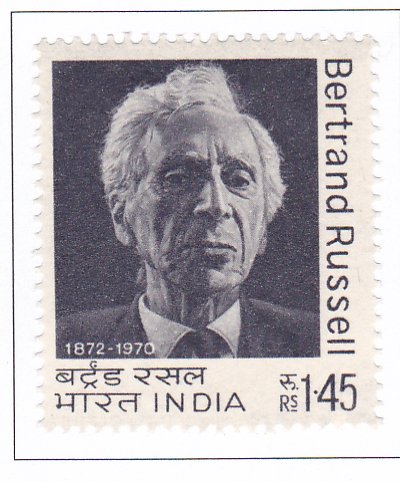Bertrand Russell 1872-1970

Technical Data
| Stamp Set | Birth Centenary Personality Series |
|---|---|
| Date of Issue | October 16, 1972 |
| Denomination | INR 1.45 |
| Quantity | 3,000,000 |
| Perforation | comb 13½ x 14 |
| Printer | Security Printing Press, Nashik |
| Watermark | No Watermark |
| Colors | Black |
| Catalog Codes |
Michel IN 545 Stamp Number IN 561 Yvert et Tellier IN 348 Stanley Gibbons IN 667 |
| Themes | Anniversaries and Jubilees | Famous people | Mathematics | Men | Nobel Laureates | Philosophers |
Bertrand Russell, a visionary advocate of world peace, envisioned a future where humanity would be engulfed by waves of happiness, dispelling the darkness of hate and fear. Born on May 18, 1872, Russell embarked on a remarkable intellectual journey, studying Mathematics and Moral Sciences at Trinity College, Cambridge, where he later served as a Lecturer and was appointed as a Fellow of the Royal Society in 1908.
A committed pacifist, Russell faced persecution for his anti-war stance during World War I. His involvement with the Labour Party led him to visit Russia, where he penned his observations in “The Practice and Theory of Bolshevism.” His travels extended to China, where he immersed himself in Chinese life and philosophy, culminating in the book “The Problem of China.”
Russell authored over fifty books spanning mathematics, philosophy, sociology, and other academic disciplines. A captivating speaker, he frequently contributed to the BBC’s “Brain Trust” programs and delivered the inaugural series of Reith Lectures in 1947. Sympathetic to India’s struggle for independence, he chaired the Indian League in Britain, supporting India’s quest for self-governance.
In his later years, Russell dedicated himself to the cause of world peace, co-founding the Campaign for Nuclear Disarmament and establishing the Bertrand Russell Peace Foundation and the Atlantic Peace Foundation in 1963. His advocacy for international resistance against nuclear war left an indelible mark on the global peace movement.
Throughout his life, Russell’s personal relationships were as varied as his intellectual pursuits. He married four times and had three children. He spent his final years at Plas Penrhyn in North Wales, where he passed away on February 2, 1970, at the age of 98.
The commemorative stamp featuring Bertrand Russell, reproduced with the courtesy of M/s. Keystone Press Agency Ltd., pays tribute to his enduring legacy as a philosopher, mathematician, and tireless champion of peace.
